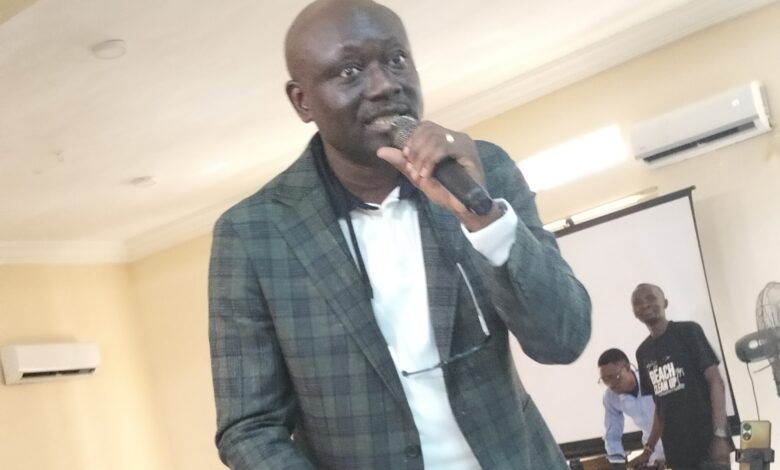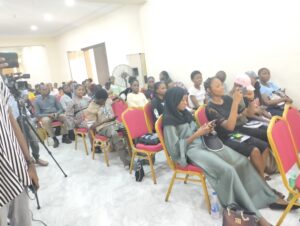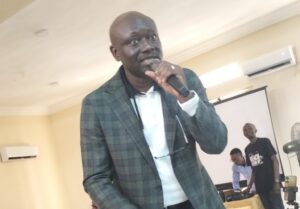
The founder and CEO of TheCable Online Newspaper, Mr. Simon Kolawole, has charged journalists to leverage Artificial Intelligence (AI) to stay relevant in the ever-evolving media landscape.
Mr. Kolawole gave the charge during the Nigerian Institute of Journalism (NIJ’s) 30th professional forum, themed “Journalism in the Age of AI”, held at the Kessington Adebutu Media Resource Centre of the monotechnic, Ogba, Lagos, on Wednesday.
He emphasised the importance of embracing the initiative, warning media practitioners against complacency, citing a quote that says “AI will not take our jobs –but it will take the job of those who don’t know how to use AI.”
The veteran journalist highlighted the four (4) types of AI, including Reactive Machine AI, Limited Memory AI, Theory of Mind AI and Self-Aware AI.

He described the Reactive Machine AI as one with no memory, designed for a very specific task, works with presently available data and seemingly intelligent, citing Netflix recommendations as an example.
With reference to Limited Memory AI, Kolawole explained that it can recall past events, monitor specific objects or situations, and can’t retain that data in a library of past experiences to use over a long-term period. Examples are generative AI tools such as ChatGPT, Bard and DeepAI as well as virtual assistants and chatbots like Siri, Alexa, Google Assistant, and Cortana.
He pointed out that Theory of Mind AI would have the functionality to understand the thoughts and emotions of other entities, simulate human-like relationships as well as understand and contextualise artwork and essays. However, the CEO emphasised that there are no examples yet, as they are “still undergoing development”.

The media practitioner noted that Self-Aware AI would possess super AI capabilities, with its own set of emotions, needs and beliefs, and analyse voices, images and other kinds of data to recognise, simulate, monitor and respond appropriately to humans on an emotional level.
He further said that emotion AI is unable to understand and respond to human feelings, adding that there are no examples, though “still in development”.
The founder also revealed the AI tools for journalists including Chatbots and Large Models (LLMs), Misinformation Fighters, Transcription Tools, and Apps and programs marketed with ‘AI’.
While examples of LLMs are ChatGPT and Claude, he stated that chatbots are designed to simulate a human-like response, and are useful when asking specific, targeted questions with thorough instructions.
He outlined the examples of misinformation fighters such as RealityDefender, TrueMedia, and Pindrop, explaining that they determine whether visuals, text or audio have been AI-generated or manipulated.
“RealityDefender analyzes video, images and text. TrueMedia spots deepfakes and AI-generated imagery by aggregating results from multiple AI tools. Pindrop detects deepfake audio. While some AI-generated images are easy to identify, others can still fool journalists.”
The journalism expert mentioned that transcription tools automatically write out what is said during video and audio interviews, speed up the process, double-check spelling, names, non-English words, technical terms and punctuation.
He equally highlighted sensitive interviews uploaded on the internet, with examples including Otter.ai, Whisper, and Trint.
The media entrepreneur explained that apps and programs marketed with ‘AI’ are grammar and spell checking apps that have recently started using generative artificial intelligence, noting that they rely on AI to suggest and recommend text.
“Grammarly’s generative AI can respond to user prompts, including drafting and rewriting, altering tone, personalizing or creating an outline. Plagiarism is a danger,” he added, citing grammarly as an example.
He outlined the benefits of AI, including speed/time-saver, taking over monotonous/repetitive work, providing raw material and detecting fakes, while the downsides are “cannot exercise judgment, cannot implement ethics, danger of plagiarism, can mislead and cannot source exclusives.”
On his part, the Provost of NIJ, Mr. Gbenga Adefaye expressed gratitude to the speaker for sharing his wealth of experience and knowledge with the students and lecturers alike.

Mr. Adefaye corroborated the founder of TheCable, advising students on ways to go about the use of AI in the search for knowledge.
The former Editor-in-Chief and General Manager of Vanguard Newspaper, alongside the Registrar of the institution, Mrs. Patricia Kalesanwo presented an award of appreciation to the speaker for his insightful presentation.
Dignitaries present at the forum include the Deputy Provost, Dr. Adeboye Ola; Head of Department (HOD), General Studies, Mrs. Popoola Maureen and former Deputy Provost, Dr. Dele Omojuyigbe.
Others are Director of Special Programmes, Dr. Jide Johnson; Public Relations Officer (PRO), Mr. Tolu Ojemuyiwa and a host of other lecturers as well as students of the school.







